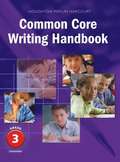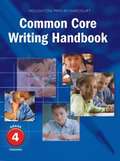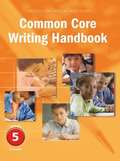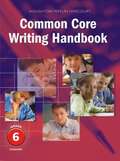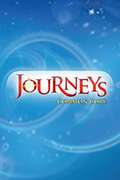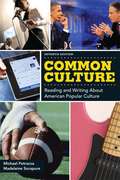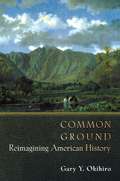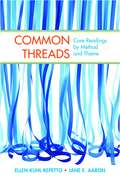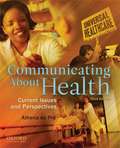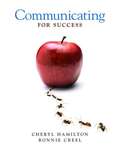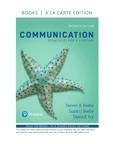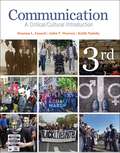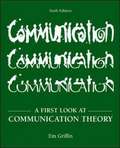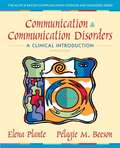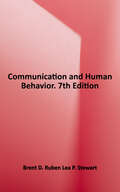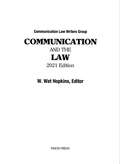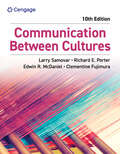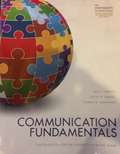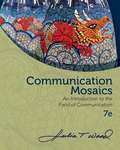- Table View
- List View
Common Core Writing Handbook, Grade 3
by Houghton Mifflin Harcourt Publishing Company StaffNIMAC-sourced textbook
Common Core Writing Handbook, Grade 4
by Houghton Mifflin Harcourt Publishing Company StaffNIMAC-sourced textbook
Common Core Writing Handbook, Grade 5
by Houghton Mifflin Harcourt Publishing Company StaffNIMAC-sourced textbook
Common Core Writing Handbook, Grade 6
by Houghton Mifflin Harcourt Publishing Company StaffNIMAC-sourced textbook
Common Core Writing Handbook, Grade K (Journeys)
by Houghton Mifflin Harcourt Publishing Company StaffNIMAC-sourced textbook
Common Culture: Reading and Writing about American Popular Culture (7th Edition)
by Madeleine Sorapure Michael PetraccaTextbook on American popular culture, social life, and customs.
Common Ground: Reimagining American History
by Gary Y. OkihiroOkihiro not only exposes the artifice of these binaries but also offers a less rigid and more embracing set of stories on which to ground a national history. Influenced by European hierarchical thinking in the late nineteenth and early twentieth centuries, Anglo Americans increasingly categorized other newcomers to the United States.
Common Places: Integrated Reading & Writing (Third Custom Edition)
by HoeffnerCommon Places teaches students to read from a writer's point of view by considering the choices writers make when presenting their content. It also encourages students to write from a reader's point of view as they face the same choices with their own writing. Students immediately and continually emulate recursive reading and writing processes as they work through the text.
Common Threads: Core Readings By Method and Theme
by Ellen Kuhl Repetto Jane E. AaronCommon Threads is a brief nonfiction reader with concise but comprehensive reading and writing instruction. Its unique rhetorical and thematic organization allows teachers to seamlessly blend it into their existing curricula. With brief high-interest readings, probing questions, extensive writing suggestions, and practical reading and writing instruction, Common Threads gives students all the instruction, practice, and support they need to engage with complex texts.
Communicating about Health: Current Issues and Perspectives (3rd edition)
by Athena Du PréThe leading text in its market, Communicating About Health: Current Issues and Perspectives, Third Edition, provides a more far-reaching approach than any other health communication text. Written by Athena du Pré--an experienced researcher and noted scholar--the book offers an excellent balance of theory and practice; research and pedagogy; coverage of patient/caregiver issues; and material on the current, historical, and philosophical backgrounds of communication in health care. Now in its third edition, this highly engaging text is more accessible than ever to students. It integrates many more real-life examples and case studies and also builds upon the previous editions' coverage of diversity, featuring new material on cultures and health systems within the U. S. and abroad. A brand-new chapter, "Public Health Crises and Health Care Reform" (Chapter 12), addresses timely concerns about modern health care. In addition, the third edition incorporates enhanced pedagogical features and new supplemental resources, including: *Career Opportunity boxes showcasing more than one hundred careers related to health communication and links to job listings and further information *Can You Guess ?boxes challenging students to consider such questions as "Which state has the highest percentage of uninsured residents?" and "In which country do people have the longest life expectancy on earth?" *Instructor's Manual(available both in print and online at www.oup.com/us/dupre) featuring sample syllabi, test questions, class activities, and more An ideal combination of communication theory and practical advice, Communicating About Health, Third Edition, is designed for undergraduate and graduate courses in health communication, health promotions and campaigns, and public health. It is also an indispensable resource for readers looking to improve their communication abilities in the health care field.
Communicating for Success
by Cheryl M. Hamilton Bonnie CreelThis book focuses on the key communication competencies recommended by the National Communication Association. Introduced at the beginning of each chapter and integrated throughout the book, these learning outcomes help focus readers as they study the theory and skills needed to become better, more effective communicators. Well-written with interesting examples and a vibrant and engaging design, the book covers all the expected topics in an introductory course with a special appendix on interviewing. Each chapter begins with scenarios to which a reader can relate and then solve as they learn about the concepts discussed in each chapter. A concentrated focus on careers in communication, highlighted in a two-page spread near the end of each chapter, brings home the relevance of communication within the real world and helps the reader learn more about how studying communication can help them throughout their lives. Additional emphasis on topics such as ethics, culture, gender, and technology can be found throughout the book.
Communicating through Graphic Design
by Kevin Gatta Claire Mowbray Golding Scott Menchin Luis Kerch Reba LibbyNIMAC-sourced textbook
Communication: Principles For A Lifetime
by Susan Beebe Steven Beebe Diana IvyCommunication: Principles for a Lifetime was designed to address the biggest challenge when teaching Introduction to Communication: how to present the variety of fundamental theory and skills without overwhelming learners. By organizing the text around five key principles of communication, authors Steven Beebe, Susan Beebe, and Diana Ivy help students to see the interplay among communication concepts, skills, and contexts. The 7th Edition has been updated with new coverage of social media communication strategies.
Communication: A Critical/cultural Introduction
by Deanna L. Fassett John T. Warren Keith NainbyThe third edition of Communication: A Critical/Cultural Introduction provides a comprehensive, yet focused, overview of communication theory, interpersonal communication, and public communication and culture through the lens of contemporary critical theory. The text shows how we produce our world through communication, challenging us to explore power, ideology, and diversity through daily interactions, both public and private. <P><P> The book begins with explanations of how communication relates to culture and power, how to distinguish between representative and constitutive communication, and how to build a message for an audience with an emphasis on social advocacy. Later chapters explore the responsibilities of speakers and listeners, alliance-building, the application of communication theory in the study of identity and perception, the relationship between language and culture, nonverbal communication, and more. The text closes with a discussion of communication as a means of social action, encouraging readers to use communication as a foundation for the advancement of issues that matter most to them.
Communication: A First Look At Communication Theory (6th Edition)
by Miriam GriffinThe most widely-used textbook for the communication theory course, "A First Look at Communication Theory" analyzes the major communication theories at a level that is appropriate for both lower- and upper- level courses. The 34 theories represented in the text reflect a mix of foundational and recent scholarship, and strike a balance of scientific and interpretive approaches
Communication
by Katherine Scraper Tara FunkPeople communicated long ago. People communicate today, too. Read to find out how communication helps people.
Communication And Communication Disorders: A Clinical Introduction
by Elena M. Plante Pelagie M. BeesonFeaturing contributions from leading experts, Communication and Communication Disorders: A Clinical Introduction, 4e blends science, clinical applications, and introductory concepts to help readers develop a sound understanding of the field. Appropriate for both majors and non-majors, the text’s consistent format and unifying organization address communication disorders involving articulation, fluency, voice and swallowing, language, and hearing. Focusing on communication disorders over the lifespan, the text balances speech-language pathology and audiology and includes separate chapters devoted to child and adult disorders. <P><P>This edition includes a new chapter on pediatric audiology; expanded discussion of language acquisition; and more information on autism, ADHD, intellectual disabilities, and childhood aphasia. Case illustrations, figures, and photographs are used liberally to illustrate concepts and a capstone chapter highlights possible careers.
Communication and Human Behavior
by Brent D. Ruben Lea StewartA knowledge of human behavior helps us understand ourselves, our actions, our motives, our feelings, and our aspirations… <p><p> Communication and Human Behavior portrays a broad and colorful landscape of the field, outlines the history of communication study, and focuses on communication as a basic life process that is necessary to our lives as individuals and to our relationships, groups, organizations, cultures, and societies. <p><p> Communication and Human Behavior by Brent Ruben and Lea Stewart: <p> • integrates up-to-date examples and research findings throughout, including persuasion, interpersonal relationships, organizational communication and leadership, 21st century careers, useful information about Middle Eastern culture, contemporary social media use, and more. <p> • examines the role of communication in multiple contexts of human life, including individual relationships, groups, organizations, cultural/intercultural frameworks, and public and mass communication. <p> • is expansive yet integrated, rigorous yet readable, and fuses theory and practice.
Communication Applications
by Randall Mccutcheon James Schaffer Joseph R. WycoffThis book helps students to identify and analyze the ethical and social responsibility of communicators; to identify the components of the communication process and their functions; to explain the importance of effective communication skills in personal, professional, and social contexts; to recognize audience as an important element in building responsible communication skills and to realize the importance and impact of both verbal and nonverbal communication.
Communication Between Cultures
by Richard E. Porter Larry A. Samovar Edwin R. McDaniel Clementine K. FujimuraWith its incorporation and representation of diverse perspectives, Samovar/Porter/McDaniel’s COMMUNICATION BETWEEN CULTURES, 10th Edition, helps students increase their understanding of the importance of cultural understanding for successful intercultural interactions. Packed with the latest research and compelling examples, this edition helps students look at their own assumptions, perceptions and cultural biases so they can see the subtle and profound ways culture affects communication. The 10th Edition addresses the importance of intercultural communication in the context of current global and technological and is accessible to all students, inclusive in its writing and personalization of activities.
Communication Fundamentals
by Alberts Nakayama MartínCOURSE DESCRIPTION Competent communication is based on the ability to create and share meaning effectively and appropriately in a variety of contexts. This course provides students with theoretical knowledge and practical experience in communicating interpersonally, across cultures, in groups and teams, and in public spaces. We combine an understanding of the theories and research on communication with the development of practical skills. Since audience adaptation is fundamental to effective communication, an appreciation for the differences among people will be integrated into our studies. Through speeches and a paper, in-class and on-line activities, class discussions and debates, we will explore the ways in which differences shape identities and communication styles, and how to recognize and analyze the range of ways in which people communicate, in an effort to also improve our own skills in communicating with a variety of people. A primary focus in this course is on speaking effectively, using and evaluating qualitative data, and examining human differences.
Communication in the Real World
by Richard G. Jones Jr.Communication in the Real World: An Introduction to Communication Studies by Richard G. Jones, Jr. overviews the time-tested conceptual foundations of the field, while incorporating the latest research and cutting-edge applications of these basics. Each chapter will include timely, concrete, and real-life examples of communication concepts in action. A key feature of this book is the integration of content regarding diversity and organizational communication in each chapter through examples and/or discrete sub-sections. Discussions of diversity are not relegated to feature boxes. Also integrated into the content are examples that are inclusive in terms of race, gender, sexuality, ability, age, marital status, religion, and other diverse identity characteristics.
Communication Mosaics: An Introduction to the Field of Communication, Seventh Edition
by Julia T. WoodCOMMUNICATION MOSAICS: AN INTRODUCTION TO THE FIELD OF COMMUNICATION, Seventh Edition, combines the author's signature first-person narrative style and popular student commentaries with thoroughly up-to-date research, theories, and technological information to provide both an overview of the field and a practical guide you can immediately use to improve your personal, professional, and public communication skills. By beginning with introductions to the basic processes and skills central to all communication contexts and then moving on to how we apply these aspects of communication in specific contexts such as interpersonal and public speaking, the text shows you the importance of developing your communication skills and gives you the hands-on tools you need to become a more effective communicator.
Communication Pathways
by Joseph M. Valenzano III Melissa Broeckelman-Post Erin ParcellFrom the authors of The Speaker and The Speaker's Primer comes an innovative new textbook that covers hybrid communication course curriculum in an approachable way. Communication Pathways introduces to the market a handbook-style approach to the hybrid course, with concise chapters that emphasize communication theory. The authors chose to organize content around a communication-centric theme: dialogue. The first section of the text dedicates an entire chapter to the subject, unpacking the concept for students; the authors further incorporate and explicate dialogic communication as it applies to subsequent chapter concepts. This theme is unique to the text and is a central element of what the authors aim to accomplish: create competent, dialogic communicators who know how to advocate ideas civilly, explain complicated subjects, and disagree without being disagreeable in a variety of interactive settings.
